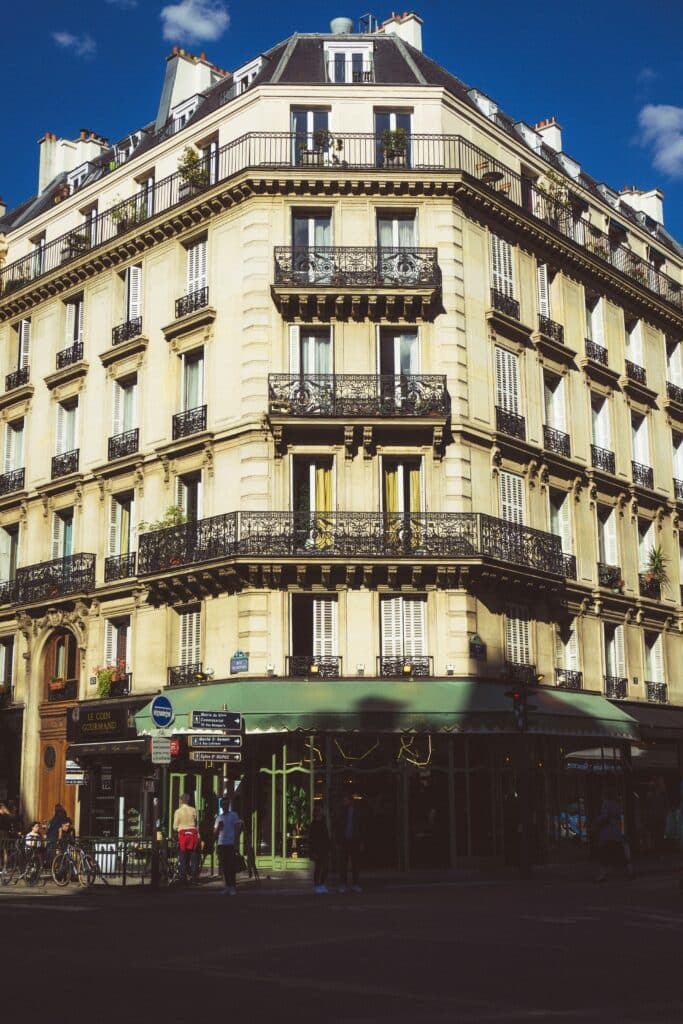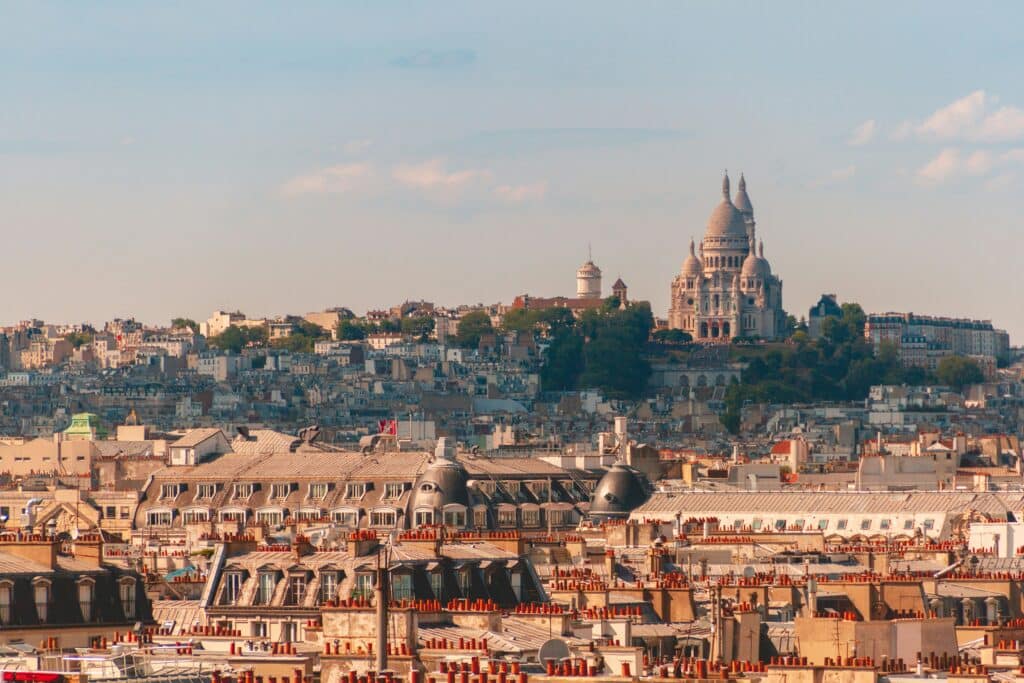Paris is said to be the beating heart of French culture, the apex of gastronomy, the creative centre of fashion and the cradle of French history. The City of Light is the city of all passions. Often praised, sometimes decried, never ignored, it never fails to fascinate thousands of expatriates. What are the pros to relocate to Paris? Where are the best areas to live? And what about healthcare?
Foyer Global Health is here to give you some useful tips to savour la vie en rose from one bank of the Seine to the other!
Expat life in Paris: the pros, the cons
The advantages
- Paris is a multicultural and cosmopolitan city: 1 in 5 inhabitants is foreign and 110 nationalities are represented.
- Numerous job opportunities: the capital is France’s economic powerhouse.
- A vibrant cultural life
- A city of living history
- A vibrant gastronomic scene
- Access to high-quality healthcare services
- A well-developed public transport network, thanks in particular to the Olympic Games.
The disadvantages
- High cost of living
- Pollution, especially in summer
- Difficulty in finding accommodation
Paris vs. London
The City of Light and the Big Smoke, two major cosmopolitan European capitals, are at once very similar and very different, appealing to thousands of expatriates in equal measure. Some appreciate London’s safety and civic mindedness compared to Paris, with its dynamism and accessibility to food, culture and history.
Paris, like London, is an expensive city in terms of both housing and food and, like London, is home to many tourist and cultural attractions. While Paris offers many employment opportunities, it is less attractive to international investment. The British capital, on the other hand, is a hub of international finance, attracting persons with profiles in business and commerce. Nevertheless, Paris outclasses its rival on the culinary scene.
With plenty of green spaces and parks, London offers a better quality of life than Paris. Ultimately, your choice may just be a matter of preference or language!
Accommodation in Paris
How to find your new home?
Finding accommodation in Paris as an expatriate is a challenging process: the real estate market is under pressure, housing is expensive and the documents required can be complicated to obtain as a newcomer to France.
The first step is to define your search criteria (district, neighbourhood, price, surface area, rent/buy) according to your needs and preferences. Some sites that may help you to narrow your search such as, seloger.fr, bien’ici, or ad sites such as Le bon coin or pap.fr. More innovative platforms include manda.fr, locatme.fr or apps like Jinka that centralize all rental listings.
Before you even visit your preferred find, make sure you have your application ready with documents such as a proof of identity, tax return, employment contract, bank statement and pay slips. Because of the shortage of accommodation and the high demand, the rental market in Paris is fast paced. At the same time, there exists a wide range of accommodation in Paris, both in terms of size (from tiny rooms to very spacious apartments) and price.
Don’t forget that electricity, gas and internet costs are usually not included in the rent. Most agencies and individuals ask for a security deposit, usually one month’s rent, and proof that your salary is at least three times the monthly rent. You may also be asked to provide a guarantor to ensure payment of the rent. Some expats use insurance brokers such as Garantme.

What are the best areas to live in Paris as an expat?
Paris is divided into 20 arrondissements, arranged in a “snail-like pattern” from the center (1st arrondissement) outwards (20th arrondissement). Parisian “neighborhoods” can be located in a single arrondissement or straddle several arrondissements.
The perfect neighborhood for you will depend on your personal situation, preferences, lifestyle and… your budget! Obviously, if you’re moving to Paris with your family, your priorities won’t be the same as if you’re a young single professional. While Le Marais (3rd and 4th arrondissements), with its lively nightlife, trendy art galleries and medieval architecture, will appeal to young professionals, as will the trendy yet popular Oberkampf district (11th), families may prefer the quieter but still lively atmosphere of the Batignolles district (17th) or the upscale residential areas of the 16th arrondissement. The Latin Quarter and Notre-Dame (4th and 5th arrondissements) are also among the most popular spots among expatriates. In addition, neighborhoods such as Montmartre (18th arrondissement), Belleville (20th arrondissement) and Bastille (11th arrondissement) appeal to all profiles, offering a wide range of advantages for both solo expats and families such as quality of life/rent price ratio; proximity to green spaces; and lively nightlife. While the 15th arrondissement attracts families, the Canal Saint-Martin district appeals to bohemian souls with a taste for conviviality.

Many expatriates also choose to live on the outskirts of Paris, allowing them to enjoy a quieter lifestyle while remaining in close proximity to the capital.
Working in Paris
The French capital is one of the most productive cities in the world. The Paris job market is both dynamic and diverse. Paris is a major economic hub, offering a wide range of opportunities in sectors such as finance, catering, art, fashion and luxury goods, business services, research, technology, marketing, tourism and healthcare, replete with multinationals, start-ups and public institutions alike. While it’s important to be fluent in French for most jobs, it’s also possible to find work among the many international companies based in Paris. As elsewhere in France, there are several types of contracts: CDD, fixed-term contracts; CDI, open-ended contracts; temporary employment contracts (intérim). Websites such as LinkedIn, Welcome to the jungle, Hello Work and France Travail can help you find a job.
As an expatriate in Paris, it’s also possible to set up your own business. You can choose among the several types of company structures in France (SARL, SA, EURL, micro-enterprise) depending on your activity. You should get some help to set up and run your business as the administrative part of it can be cumbersome. If you’re looking for a co-working space, Morning, Patchwork or We Work offer attractive working environments.
Family life in Paris
Childcare for young children
Paris offers a range of childcare facilities for young children, including collective crèches (municipal, family-run, associative or private) and nurseries (‘halte-garderies’), where children aged 2 months to 3 years are cared for by childcare professionals. For municipal crèches run directly by the Mairie de Paris, waiting times can be very long, and you need to apply well in advance (parents apply for a spot as early as the 6th month of pregnancy). For public childcare facilities in Paris, fees are proportional to parents’ income.
You can also choose to work with a certified nanny (‘assistance maternelle’), who takes care of one to three children at a time.
For more information, click here!
What are the best schools for expat children?
If you decide to enroll your children in the French public education system, either in nursery school (ages 3 to 5), primary school (ages 6 to 11), junior high school (ages 12 to 15) or high school (ages 16 to 18), you won’t be able to choose your school, as it depends on where you live (sectorisation/school map).
You can also opt for private French schools accredited by the French Ministry of Education or “hors contrat” without any link to, or supervision by, the Ministry of Education..
The top public lycées in Paris are Louis Le Grand, Henri IV and Stanislas, and the Ecole Alsacienne. If you’d like your children to follow an international curriculum, there are many international schools in Paris for pupils from primary to high school, and some public schools in Paris also have international sections. Among the best private international schools are the Ecole Internationale Bilingue (Jeannine Manuel), the International School of Paris and the American School of Paris.
Facil’ Familles
Facil’ Familles is the online service for registering your children for activities or paying the fees for such activities. Your account is created automatically when you enroll your child in an activity, or when your child first registers in a public nursery or elementary school.
Healthcare in Paris
The French capital is home to several excellent health facilities, both public and private, offering a wide range of high-quality care. As an expatriate living in Paris, you can be covered by the public French health insurance (‘assurance maladie’) while purchasing private international health insurance for greater flexibility and cover. La Pitié Salpêtrière, Hôpital Européen Georges Pompidou and Hôpital Paris Saint-Joseph, three Parisian hospitals, feature in Newsweek’s ranking of the world’s best hospitals. The American Hospital in Paris also offers high-quality healthcare, particularly to foreign and English-speaking patients.
Daily life in Paris
An expensive lifestyle
The French capital is one of the most expensive cities in France and the world. According to a study published by INSEE in 2022, living in the Ile-de-France region is on average 7% more expensive than in other cities.
The cost of living will, of course, largely depend on your needs and the area in which you choose to live. As in London and other European capitals, property prices are very high, both for rentals and purchase. The average rent for a three-bedroom flat in Paris is between €2,500 and €4,000; the average purchase price per square metre is just over €9,000.
Leisure, transport and food also weigh heavily on the budget, particularly in sought-after areas. A monthly metro pass costs around 85 euros.
Getting around Paris
The easiest way to get around Paris is by public transport (metro, bus, tram, and shuttle), which covers the whole of the city. Cycling is also a big hit with many Parisians, far outstripping the car: the number of cyclists on cycle paths has soared since the pandemic, and the number of facilities to support cyclists is increasing. The Mairie de Paris (Paris City Council) is planning to build a huge network of cycle paths across the capital. There are also self-service car-sharing schemes (Mobilib’, Share Now, Free2Move) and scooter-sharing schemes (Citysccot, Yego) for those who prefer motorised vehicles but do not have the space or budget to own one. VTCs and taxis are also useful for short journeys or outside public transport operating hours.
Useful links:
